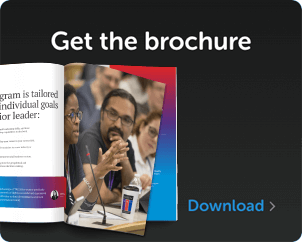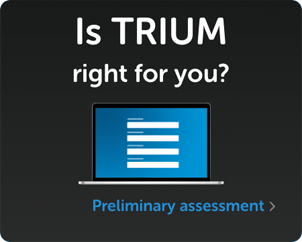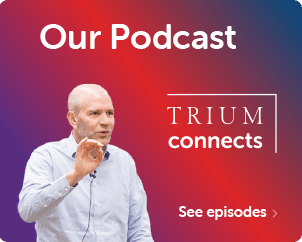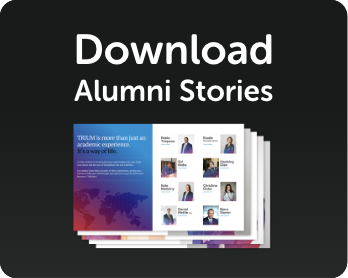
Max Nikolaev (Class of 2022)
Vice President CARBO
Max Nikolaev is a veteran of the oil and gas industry, holding senior positions with global companies including his current role as Vice President of CARBO, an industry-leading company that provides innovative technologies. He’s also a multi-award winner and quick to point out that, despite this experience, TRIUM and the alumni network have taught him immeasurably.
Max spoke with TRIUM about why the community was a key part of his decision to enroll, the work that led to his Gold Stevie award as Executive of the Year, and what’s causing the current energy crisis.
What was your motivation for pursuing a Global EMBA? Why did you choose TRIUM among other global programmes?
One of the main reasons I had for pursuing a global EMBA was to expand my network. I was working at Schlumberger, which is a global company but very specific to one niche of oil and gas, so I wanted to develop my network beyond that.
I then had two criteria when selecting a programme. First, as I had held a number of global roles in Schlumberger, the programme needed to be global to maintain the diversity I was used to and to keep the network live across multiple continents. Second, it needed to have great people in the cohort; not just the faculty and professors but the other students as those are the people I would be making relationships with.
When it was time to make a decision, I had a shortlist of two schools and TRIUM was one. I already knew it could help expand my network and it was a global programme, but assessing the people I’d meet was harder. I interviewed about 30 alumni across both schools and it became clear that TRIUM alumni were ahead on quality, helpfulness, and being genuine. Those are the qualities that I enjoy and want to be around, and ultimately the qualities that I wanted my network to have.
How has TRIUM’s foot-on-the-ground approach to learning in the six international modules impacted the way you approach your work?
When I joined TRIUM I had held global roles for over a decade, so I had business partners around the world and I enjoyed different cultures and business nuances, as well as activities like deal making and negotiations. TRIUM surprised me and broadened my horizons by showing me different angles to things I thought I already knew.
One of the most valuable aspects was the ability to connect with local businesses anywhere we travelled to. Entrepreneurs and government officials would deliver talks, and they were always very genuine and sometimes even brave in sharing their perspective on local and global trends. That showed how they had been resolving different issues, and highlighted the way of thinking in different countries and continents, which is amazing. TRIUM demonstrated that, regardless of previous experience, there’s a lot more to learn in different parts of the world.
Can you tell us more about the value your cohort has added to your experience?
Once you reach middle age, I think it’s rare to make strong relationships with someone. Normally we nurture the relationships we’ve developed from university, school, family and so on. Having one good, reliable friend is invaluable at this age. Thanks to TRIUM, I now have 50. The entire cohort became so close, friendly, and supportive. It’s incredibly valuable and there’s no way to put a number or qualification on it. We have created a very strong and vibrant bond.
Putting the emotional part aside, I’ve learned as much, if not more, from my cohort as from the faculty. My cohort opened my eyes to markets and jobs I’d never heard about, and gave me investment opportunities in some companies I was unaware of. The knowledge I’ve been able to soak up from the cohort has been eye-opening and mind-blowing.
You were recently named Executive of the Year winning a Gold Stevie® Award in The 19th Annual International Business Awards®. Tell us a bit more about this award and the work you’ve done to achieve this well-deserved honor?
The application for the award was really a shot in the dark. I was working with my marketing team, trying to highlight what the company has been doing in the energy markets. We decided to make a few submissions for Stevie Awards and one of the relevant options was Executive of the Year. It was a simple submission, explaining what I had done in the couple of years since joining CARBO, the three main things I had been pursuing, and what was important to me.
The first of the three was customers and their story. I had suggested to the board that we needed to focus on customer centricity. It’s important that our clients feel they are heard and taken care of. CARBO has a strong R&D portfolio to create new solutions for clients if needed – not simply to push them into buying, but to develop something unique to meet their needs. We took this seriously and went through a Net Promoter assessment of 1,000 customers. Our score was 85%, which is very high but still had room for improvement. From that feedback, we made changes in our customer service, sales personnel, and how we interact with customers. We also reassessed our portfolio and saw where ESG can be clearly identified and provided to the customers. As a result, we changed our rhetoric to demonstrate to our energy operators that the technology we use, and make, will benefit their ESG, lower emissions, and help them in their strategies.
The second was about thoughtful leadership. As part of the TRIUM journey we had a 360-degree assessment, which involves receiving feedback from your boss, peers, and reports, providing qualitative and quantitative data in response to your leadership skills. On top of that, I was working with an executive coach in my job and I had two internal assessments as well, so in two years I had three assessments. I was very proud to see that each of them came out with very high results. I used that qualitative feedback to improve team spirit, which in turn helped to keep the team intact – we had zero attrition in the time of the Great Resignation and energy crisis, with some members of the team openly telling me that they wouldn’t be staying if they were working under a different manager. I learned from TRIUM how to manage and address feedback, how to listen, change yourself, and make a stronger bond within the organisation, so this felt important to include in the award submission.
The third was about innovation and digitalisation. We’ve increased the R&D budget as well as resources into developing something that was stagnant but customers had been asking for. This connects to the customer centricity project, listening to what innovations customers need. We pushed for additional patents and solutions, plus the number of partnerships with other firms to develop new technologies.
Once we’d outlined those three things, it gave a good story of my daily work since joining CARBO and fortunately the juries reading the submissions felt it deserved the award.
You work in the Energy Gas industry. What are your thoughts and/or predictions for the current Energy crisis?
There is important context to the energy crisis that isn’t being reported on. It didn’t start with Russia’s invasion of Ukraine as many journalists want to portray, it started almost a decade ago in 2014. At that time, politicians and non-experts were essentially bullying the industry and making it a toxic place to invest, which resulted in a lot of capital being diverted from oil and gas. Experts spoke about the risk this posed: under-capitalisation while simultaneously not exploring and finding new fields could leave the world without energy. There has of course been a lot of messaging about renewables and a lot of people jumped on this bandwagon, but this still hasn’t been able to scale and there isn’t a backup. So what happened is the funding was cut to one source, and the other couldn’t be scaled. What we’re seeing today is the inevitable result of that.
The situation is a little different in Europe as it’s mainly been dependent on Russian gas, but the story is bigger: there isn’t enough energy for the growing demand, and there aren’t enough resources to scale it quickly enough because those resources haven’t been developed over the last decade. It’s a long cycle to get enough fossil fuel to keep the middle class growing and pulling people out of poverty, it takes about five to ten years. On top of that, it’s getting increasingly difficult to find those fields.
What we’re seeing today is a flatlining demand for oil, but the demand for natural gas is really high – and the price is subsequently very high too.
So what’s the way forward? I would go back to the topic of ESG. When people talk about ESG it’s mainly environmental sustainability, but nobody really talks about governance. Yet governance is where the powerful of the world have failed us over the last ten years. We wouldn’t be in the situation we are now if back-up plans had been built, ensuring that sustainable sources are available and scaling properly on renewables. There’s been a lot of political turmoil in recent years, with plenty of nationalist rhetoric and chasing populism, but, to be blunt, we need better leaders. Leaders who can drive the energy policy that allows for supply, security, and allows growth in the industry and global GDP.
Tell us an interesting fact about you that your fellow alumni might find interesting?
Not a lot of people know that I enjoy acting. It was one of my hobbies as a child, and after a 15-year break I joined a local amateur theatre here in Houston, Texas. I actually joined at the same time as starting TRIUM, and it’s my way of coping with stress and making sure I have time to do something for myself. We rehearsed for a year and gave our final performance in January 2022, to a sold-out theatre which was amazing.
How do you spend your downtime?
My wife and I have two sons, so there’s a lot of energy. As they get older they’re getting busy with activities – music, chess, sport, and others – so my downtime is mainly driving them around and making sure they’re provided for. When we have plans for ourselves, it’s usually seeing friends and family, playing board games, and exploring new places.
How are you engaging with the TRIUM alumni community? Are you in touch with other TRIUMer alumni? What is the activity like in your region?
I engage with the community a lot. I frequently travel internationally, so once or twice a month I’ll be outside the USA and it’s become a habit to check who’s in the city or country I’m visiting. I’ve met people in Spain, France, the UK, Africa, Latin America, basically anywhere I go there’s TRIUM alumni. We meet for coffee, conversation, introductions, and I’ve learned a lot from these encounters. Over the past two years we’ve had a large influx of people moving to Texas from California and New York, which also brought a lot of TRIUM alumni to the state. There are now moves to form an official alumni cluster here in Texas so we can host events and get-togethers to keep the network strong and I have volunteered to be a TRIUM alumni champion.
How would you describe your TRIUM experience in three words?
Deep. Wide. Enriching.






